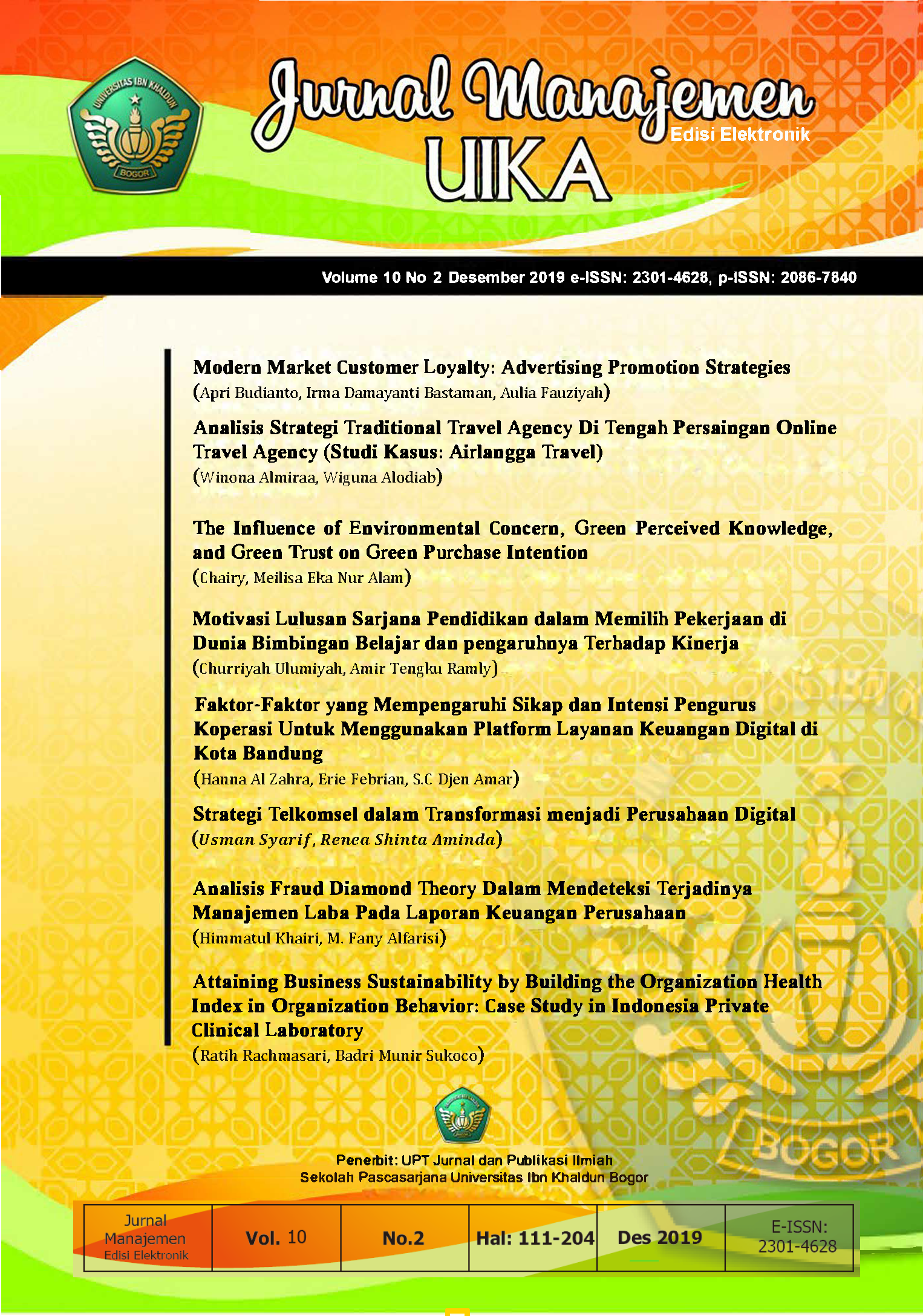Attaining Business Sustainability by Building the Organization Health Index in Organization Behavior: Case Study in Indonesia Private Clinical Laboratory
DOI:
https://doi.org/10.32832/jm-uika.v10i2.2583Keywords:
Business sustainability, organizational health, Organizational Health Index (OHI), clinical laboratoryAbstract
Indonesian health industry predicted will rapidly develop in the next five years. Indonesia health spending spending will reach US $ 60.6 billion over the period 2012-2018. PT. X, a company in the health industry, has significant growth and widely spread 18 branches all over Indonesia. Therefore, the business sustainability of PT. X needs to be continuously maintained and improved. In accordance with the company's vision "became a national referral center clinical laboratory”, keeping a good performance as well as business sustainability, PT. X need to maintain a company performance and health of their organization. A questionnaire referring to nine element McKinsey Organizational Health Index was applied to assess PT.X organization health. The OHI score obtained from the survey shows that PT X is quite healthy due to surpass the threshold of a healthy organization. It is recommended that organizational behaviour improvement refers to market focus basic model; achieving excellent performance for maintaining business sustainability.
References
Ahmadian, L., Nejad, S. S., & Khajouei, R. Evalua-tion methods used on health information sys-tems (HISs) in Iran and the effects of HISs on Iranian healthcare: A systematic re-view. International journal of medical informat-ics, 84(6), pp. 444-453. (2015)
Gagnon, Chris, et.al. Organizational Health : A Fast Track to Performance Improvement. McKinsey Quartely (2017)
Galpin, Timothy, J. Lee Whitttington, and Greg Bell. "Is your sustainability strategy sustainable? Creating a culture of sustainability." Corporate Governance 15.1 (2015): 1-17.
Garland, Ron. The Mid Point on Rating Scale : Is It Desirable?. Marketing Bulletin, Vol.2, pp.66-70 (1991)
Hannum and Wayne. Middle School Climate : An Empirical Assesment of Organizational Health and Student Achievement. Educational Admin-istration Quartely. Vol. 33, No. 3, pp. 290-308 (1997)
Keller and Price. Beyond Performance : How Great Organization Build Ultimate Competitive Ad-vantage. Canada : John Wiley & Sons, Inc (2011)
Robert Ong'eta Kinanga and Samuel Kimnyak Par-toip. Linkage between Target Setting in Per-formance Contracting and Employee Perfor-mance. A Kenyan Perspective. Journal of Hu-man Resources Management Research, Vol. 2013 (2013)
Kraimer, M. L., Seibert, S. E., Wayne, S. J., Liden, R. C., & Bravo, J. Antecedents and outcomes of organizational support for development: The critical role of career opportunities. Journal of Applied Psychology, 96(3), 485-500. (2011)
Leinconi, Patrick. The Advantages : Why Organiza-tional Health Trump Everything Else in Busi-ness. San Francisco : Wiley Inprint (2012)
Lozano, Rodrigo. Sustainable Business Model : Providing a More Holistic Perspective. Business Strategy and the Environment. Wiley Online Library, pp.1-8 (2018)
Mondy, R. Wayne and Noe Robert M.,. Human Re-source Management, Tenth Edition, Jilid I, Pen-terjemah Bayu Airlangga, M.M., Penerbit Er-langga, Jakarta (2011)
Ramalu, Subramaniam., Kumar, Dileep., Nair, Hari A.P., Organizational Health : Delineation, Construct and development of a Measurement Model. Asian Social Science Journal. Vol.10, No.14, pp. 145-155 (2014)
Searcy, Cory. Measuring Enterprise Sustainability. Business Strategy and the Environment. Wiley Online Library (2014)
Suliyanto. Metode Penelitian Bisnis untuk Skripsi, Tesis dan Disertasi. Penerbit Andi (2018)
www.marketeers.com. 2018 Pasar Industri Kesehatan Indonesia Capai US$ 60 miliar (2013)
Wibowo, Daniel Budi. Tantangan Pertumbuhan In-dustri Pelayanan Kesehatan di Indonesia. Semi-nar INDO-HCF, Jakarta 25 April 2018 (2018)
Downloads
Published
How to Cite
Issue
Section
License
Authors who publish with this journal agree to the following terms:
- Authors retain copyright and grant the journal right of first publication with the work simultaneously licensed under a Creative Commons Attribution-NonCommercial-ShareAlike 4.0 International License that allows others to share the work with an acknowledgement of the work's authorship and initial publication in this journal.
- Authors can enter into separate, additional contractual arrangements for the non-exclusive distribution of the journal's published version of the work (e.g., post it to an institutional repository or publish it in a book), with an acknowledgement of its initial publication in this journal.
- Authors are permitted and encouraged to post their work online (e.g., in institutional repositories or on their website) prior to and during the submission process, as it can lead to productive exchanges, as well as earlier and greater citation of published work (See The Effect of Open Access).











